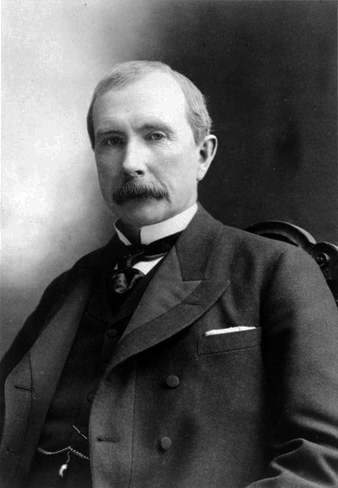Źródło: John T. Flynn, Women’s Home Companion (1915) oraz cytat w God’s Gold (1932)
John D. Rockefeller słynne cytaty
„Najważniejszą rzeczą dla młodego człowieka jest stworzyć dla siebie kredyt – reputację, charakter.”
Źródło: Bertie Charles Forbes,The Men Who Are Making America (1918)
„Raczej zatrudnię człowieka entuzjastycznego niż tego, który wszystko wie.”
Źródło: Bryan Curtis, Classic Wisdom for the Professional Life (2010), s. 75
Źródło: Random Reminiscences of Men and Events (1906)
„Kto pracuje przez cały dzień, ten nie ma czasu na zarabianie pieniędzy.”
przypisywane.
Źródło: Kamil Cebulski, Efekt motyla. Jak jedna decyzja może wpłynąć na całe twoje życie i zaważyć nad biedą lub bogactwem?, Internetowe Wydawnictwo Złote Myśli Netina, Gliwice 2006.
Źródło: Orison Swett Marden, How They Succeeded (1901)
Źródło: Dale Carnegie, How to Win Friends and Influence People (1937)
John D. Rockefeller: Cytaty po angielsku
Interview with William Hoster, quoted in God's Gold (1932) by John T. Flynn
Kontekst: I believe the power to make money is a gift of God … to be developed and used to the best of our ability for the good of mankind. Having been endowed with the gift I possess, I believe it is my duty to make money and still more money and to use the money I make for the good of my fellow man according to the dictates of my conscience.
“I would rather hire a man with enthusiasm, than a man who knows everything.”
As quoted in Classic Wisdom for the Professional Life (2010) by Bryan Curtis, p. 75
As quoted in How They Succeeded (1901) by Orison Swett Marden
Kontekst: I do not think that there is any other quality so essential to success of any kind as the quality of perseverance. It overcomes almost everything, even nature.
As quoted in The Forbes Book of Business Quotations (2007) edited by Ted Goodman, p. 175
“Try to turn every disaster into an opportunity.”
Attributed in The Rockefellers (1976) by Peter Collier and David Horowitz
TIME Magazine (21. May 1928) http://www.time.com/time/magazine/article/0,9171,731797,00.html
“Don't be afraid to give up the good to go for the great”
Earliest citation found in Google Books is from 1993 https://books.google.com/books?id=bdTko5oHTd4C&pg=PA25&dq=%22give+up+the+good+to+go+for+the+great%22&hl=en&sa=X&ved=0ahUKEwiH2e_QivXLAhUps4MKHdf0A9wQ6AEIHTAA#v=onepage&q=%22give%20up%20the%20good%20to%20go%20for%20the%20great%22&f=false, where it is attributed to country-music singer Kenny Rogers. Not found attributed to Rockefeller until 2006 https://books.google.com/books?id=F7OGT9WTiPQC&pg=PA24&dq=%22give+up+the+good%22+%22go+for+the+great%22+rockefeller&hl=en&sa=X&ved=0ahUKEwjw_rb9ivXLAhXrmoMKHbgHBqkQ6wEIHjAA#v=onepage&q=%22give%20up%20the%20good%22%20%22go%20for%20the%20great%22%20rockefeller&f=false.
Disputed
Wariant: Don't be afraid to give up the good to go for the great.
“The most important thing for a young man is to establish a credit — a reputation, character.”
The Men Who Are Making America (1918) by Bertie Charles Forbes
Attributed in How to Win Friends and Influence People (1937) by Dale Carnegie
“The day of combination is here to stay. Individualism has gone, never to return.”
John D. Rockefeller, age 41, in 1880 — Allan Nevins, John D. Rockefeller (New York: Scribner, 1959), I:622.
“If your only goal is to become rich, you will never achieve it.”
As quoted in Complete Speaker's and Toastmaster's Library (1992) edited by Jacob Morton Braude and Glenn Van Ekeren
“The way to make money is to buy when blood is running in the streets.”
Attributed in The Fourth — And by Far the Most Recent 637 Best Things Anybody Ever Said (1990) by Robert Byrne; attributed elsewhere to Nathan M. Rothschild
As quoted in Steps to the Top (1985) by Zig Ziglar, p. 16
Verses written on his eighty-sixth birthday (8 July 1925) http://www.anbhf.org/pdf/lee.pdf
“The only question with wealth is, what do you do with it?”
Though attributed to John D. Rockefeller, Sr. in I Want to Make Money in the Stock Market : Learn to Begin Investing Without Losing Your Life Savings (2006) by Chris M. Hart, p. 169; this is clearly a statement of his son, John D. Rockefeller, Jr., as quoted in John D. Rockefeller, Jr: A Portrait (1956) by Raymond Blaine Fosdick, p. 189: The only question with wealth is what to do with it. It can be used for evil purposes or it can be an instrumentality for constructive social living.
Misattributed
“Good management consists of showing average people how to do the work of superior people.”
As quoted in The Harper Book of Quotations (1993) by Robert I. Fitzhenry, p. 71; the earliest published occurrence of such remarks yet located were those of Jim Low in "The Human in Public Relations" a diner address in Proceedings, Seventh Annual Meeting of the Agricultural Research Institute, October 13-14, 1958, Washington, Pt. 3, p. 83
Disputed
“I don't want a nation of thinkers, I want a nation of workers.”
Attributed by Jim Marrs in the William Lewis film One Nation Under Siege (2008); no published occurrence of this has been located prior to The Trillion-Dollar Conspiracy : How the New World Order, Man-Made Diseases, and Zombie Banks Are Destroying America (2010) by Jim Marrs
Disputed
“I have ways of making money that you know nothing of.”
As quoted by Isaac Hewitt (1879) in testimony to the New York Assembly. Rockefeller doubted that he said this, according to John D. : The Founding Father of the Rockefellers (1980) by David Freeman Hawke; this is reminiscent of the remark attributed to Jesus in John 4:32: "I have meat to eat that ye know not of." (KJV)/"I have food to eat that you know nothing about." (NIV)
Disputed
http://www.pagetutor.com/standard/chapter02_part1.html
“Do you know the only thing that gives me pleasure? It's to see my dividends coming in.”
Remark to a neighbor, quoted by John Lewis in Cosmopolitan (1908)
Random Reminiscences of Men and Events (1906)
“It is wrong to assume that men of immense wealth are always happy.”
Attributed as a statement to his Bible class (1 April 1905) in "The Loneliness of John D. Rockefeller", Current Literature (November 1906) vol. 41 no. 5,
Women's Home Companion (1915), quoted in God's Gold (1932) by John T. Flynn
